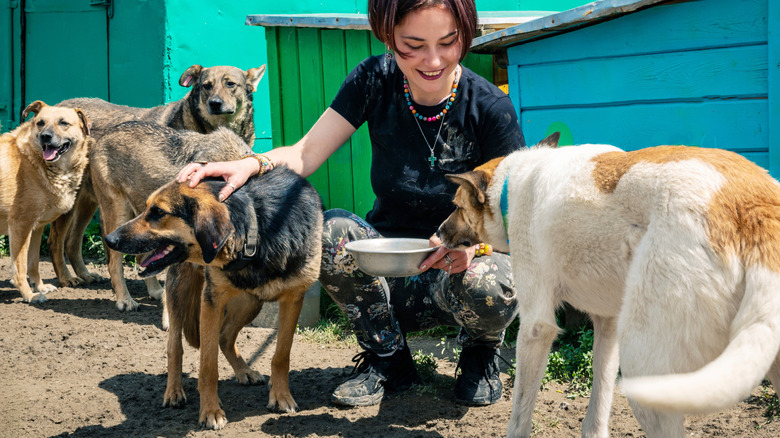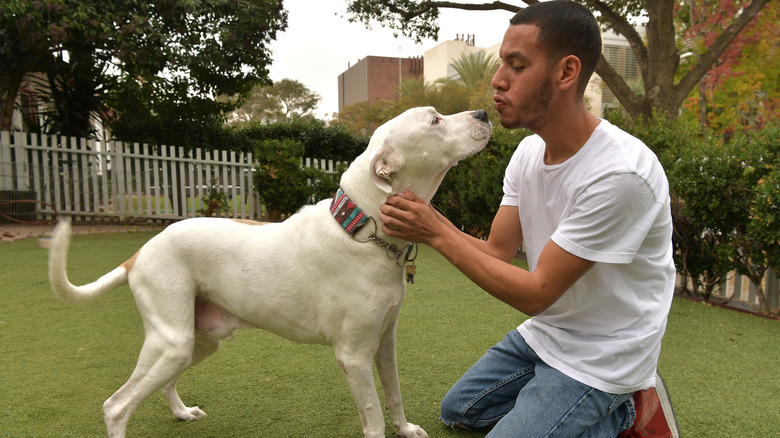5 Rewarding Reasons To Adopt A Mixed-Breed Dog From A Shelter
With all the popular purebred dogs we see around us on a regular basis, some people assume they want their next pet to be one of these breeds. They want something familiar — a specific look or trait they've seen before on social media or in a pet-food ad. Although there's nothing wrong with buying a purebred dog from a reputable breeder or adopting one from a shelter, adopting a mixed breed could provide unexpected and rewarding benefits, including lower adoption costs, higher availability, better overall health prospectives, and more.
More specifically, you typically have more options when browsing for a mixed breed and likely won't spend as much, compared to purebreds. Plus, mixed breeds have unique characteristics and a lower risk of certain health problems than purebreds, and you could be saving a life. Ultimately, they may not all look like other dogs you've seen, but mixed breeds can make great pets and loyal companions just like any other dog.
Mixed-breed dogs are unique
Many of the famous dogs we know and love from movies and television shows are purebred; Toto from "The Wizard of Oz" is a cairn terrier, Beethoven from the movie of the same name is a St. Bernard, and Lassie, who appeared in many projects, is a rough collie. These breeds, among many others, are easy to spot because of specific characteristics. You can visually determine the breed mix of a dog in some cases, such as with intentional coupling to create a hybrid designer breed. However, if there are three or more breeds, it can be much more difficult to discern by sight alone, but regardless of how many breeds are present, the mix is what makes these dogs unique.
The Pomsky, a designer mixed breed, can be 15 pounds with a fluffy Pomeranian coat and the blue eyes of a Siberian husky. Meanwhile, a 9-pound mongrel could have the long body and stubby legs of a dachshund, the sizable ears of a corgi, and the curly tail and round head of a Chihuahua. Even within the same litter, mixed-breed dogs can have their own unique appearances. Having a dog with an uncommon combination of physical features and a unique overall appearance can certainly pique the curiosity of anyone who meets it and attract positive attention for you both.
A mixed-breed dog might be cheaper to adopt than a purebred
The average cost to adopt a dog from a shelter can range from $50 to $350 and up, and this range includes all dogs, not just mixed breeds. However, shelters typically assign the higher price tags to breeds that are considered rare and in demand, such as certain purebreds. Purchasing a purebred dog from a reputable breeder usually costs even more — between $500 and $2,000 or more, to be more specific. This means you could adopt a young rat terrier-miniature pinscher mix for $400 or buy a purebred miniature pinscher puppy for over $1,000 from a breeder.
Another factor to consider is that shelters often waive adoption fees or offer special adoption promotions, as many of these animal facilities are overcrowded and desperate to empty out their kennels to make room for other dogs in their care that have to live in cages. So, unless you have your heart set on a designer mixed breed, like a cockapoo, Labradoodle, or the aforementioned Pomsky, you'll likely spend less to adopt a mixed breed over a purebred.
There are usually more mixed breeds than purebreds awaiting adoption
More than 3 million dogs end up in shelters every year, and most of these dogs are mixed breeds. For example, in 2018, researchers conducted genetic testing on dogs at a shelter in Arizona and another in California. The results, published in PLOS One, revealed that less than 5% of the 919 dogs were purebreds. This means if you're looking for a shelter dog in need of a loving home, the odds of finding a mixed breed will be greater.
Of course, the exact percentage of available mixed breeds varies from shelter to shelter and day to day. However, you'll have a better chance at finding a standard mixed breed or intentional designer hybrid breed than a purebred at your local shelter. Petfinder confirms this likelihood. This popular pet adoption site allows potential adopters to search for dogs available at hundreds of shelters in the United States and to filter their search by breed. With "Anywhere" selected as the search radius, a search for "Mixed Breed" showed a whopping 59,465 available dogs at the time of writing. More than 300 individual breeds are listed as filter options, but the numbers in these categories don't even come close to the number of available mixed breeds.
Mixed breeds have a reduced risk of certain health problems
Canine genetic testing can reveal more than just standard breed information like average height and weight; it can also provide details about diseases associated with specific breeds. The American Veterinary Medical Association published the results of a genetic test that found mixed-breed dogs have a lower risk of being affected by disease-causing mutations compared to purebreds. "This DNA-testing-based evidence shows that ... mixed breed dogs are in fact less likely than purebreds to develop the recessive disorders evaluated in the study," said Dr. Cindy Cole, the general manager at Wisdom Health, a company that focuses on genetic testing.
Dr. Sarah Wooten, a Colorado-based veterinarian, also shared her thoughts on the topic with PetMD based on her 16 years of clinical practice experience. "Mutts ... tend to have lower incidences of inherited disease, such as some cancers, back problems, and hip dysplasia," she said. She added that purebreds have "less genetic diversity" than mixed breeds. This can increase the chance of genetic defects, including bone disorders, neurological diseases, and heart disease in dogs.
You could save a mixed-breed dog's life
Adopting any dog from a shelter is rewarding and can dramatically improve its quality of life, whether it's a mixed breed or not. It could also save a life if the dog is scheduled to be euthanized at an overcrowded shelter. But unfortunately, mixed breeds are 1.8 times more likely to be euthanized compared to purebreds, and the likelihood increases with age (via the National Animal Interest Alliance).
Of course, no shelter worker wants to reach the point where euthanasia becomes a need for a healthy but unwanted dog. However, this happens at animal facilities all over the country throughout the year. Some post code-red ads on social media and elsewhere, practically begging viewers to adopt a dog to prevent this difficult decision, and sometimes the ads work. If you have in your heart to save a mixed-breed dog, or any dog, in this way, you can search for code-red shelter ads online.





